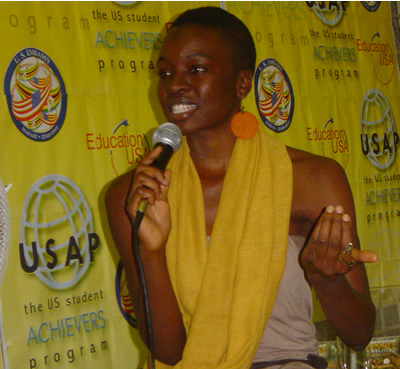Can an African make it in Hollywood or on Broadway?
Wednesday, November 2nd, 2011 by Varaidzo TagwireyiAmerican-born, Zimbabwean actress Danai Gurira, who is conquering Hollywood and Broadway, gave a talk recently about her trajectory in the industry, her artistic principles and work ethic, how she envisions her work will shape the artistic landscape for future generations, her thoughts on the future of the Arts Industry in Zimbabwe.
Danai explained how she got into acting and writing by saying that the arts found her. While in high school she realised that when she performed, something special happened between her and an audience and she felt she would lose all sense of time and place. Encouraged by her parents to pursue what she was good at, she continued her studies in the arts, after having initially studied psychology and liberal arts. Danai started to create pieces in response to the fact that she was not finding portrayals of Africans that she wanted to play. Actors tend to be at the bottom of the food chain in the American industry, but with good training during her 2nd degree, she learnt how to create her own work and not just sit and wait by the phone. This is how her world-famous play In the Continuum was born. She was encouraged to discover that she could create things in America, about Zimbabweans, and the people in both places (and in-between) would get it. It was also quite clear that Gurira appreciates and revels in the fact that her debut performance on the world stage, was of her own work, in her own voice.
While so many of us associate the film industry with glitz, glamour and money, one quickly realises that Gurira is all about the craft and creating the best artistic products she can. From early on she has been driven by her desire to create things that are connected to what is important to her, what she is trying to give the world and what she visualises about her future artistic interests. This focused attitude has led her to be quite picky about what she gives her energy to by finding out what the spirit of the work is and if it is really giving life and a different dimension and complexity to a story.
When Gurira comes home, she holds workshops in order to transfer all that she has learnt from her time in the US. She strives to help young Zimbabwean actors know the level of work-ethic, ferocity, and energy required to succeed in the competitive industry and make people feel they have no choice but to hire you. One also has to develop a thick skin as only 2-5% of your auditions may lead to work.
Though Danai felt that it would be quite tricky to say how our country should develop the industry, which is currently not so strong, she believes that we should try to nurture standards of excellence that are specific to who we are, as a nation. Though it is tempting to follow the footsteps of African countries like Nigeria, which has a thriving film industry, she feels it would be unwise to use another country’s template. There is a need for Zimbabwean artists to continuously challenge themselves, to remain sharp in artistry, and always in pursuit of excellence. Gurira insists that excellence in the quality of work we produce, will ensure that we begin to produce work that is on a globally recognisable level, not because it caters to western ideologies or structures, but because no one can deny or ignore it’s superior quality, as artistic excellence is not bound by language and culture.
In order to achieve this Gurira says Zimbabwean artists have to be innovative and pioneering in contributing to the work that will build the industry, all the while, having in the back of their minds, a clear vision about the future artistic landscape of Zimbabwe. It is about thinking far ahead and beyond ourselves, and creating something that is so excellently executed, that it will stand the test of time, so that if someone picked it up decades from now, it will still be a brilliant piece of Zimbabwean literature, (Harvest of Thorns). When asked what she wanted her legacy to be, Danai Gurira said, “I want people to pick up my work in 100 years and be able to do it – [so that] men and women have opportunities to really shine, in African roles.”











